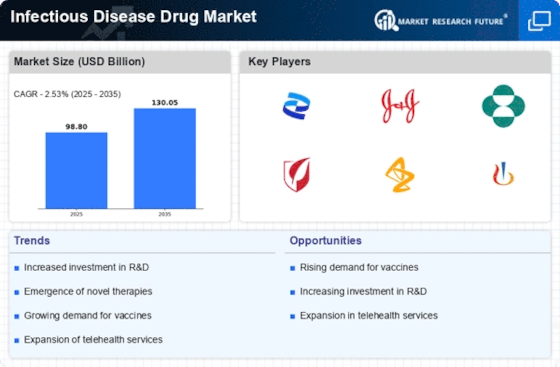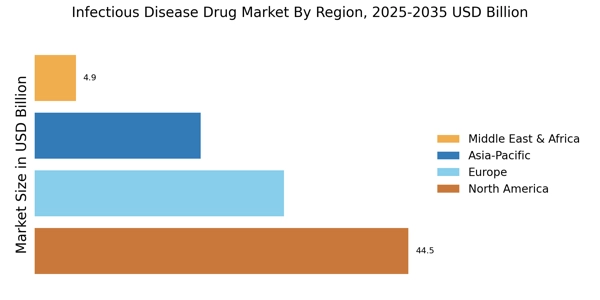Emergence of New Pathogens
The emergence of new pathogens is a critical factor driving the Infectious Disease Drug Market. The continuous evolution of microorganisms poses significant challenges to public health, necessitating the development of new therapeutic agents. Recent studies have identified numerous novel pathogens, some of which exhibit resistance to existing treatments. This situation compels pharmaceutical companies to invest in research and development to create effective drugs against these emerging threats. The Infectious Disease Drug Market is expected to expand as companies strive to address these challenges, leading to a surge in innovative drug offerings. This dynamic environment underscores the need for ongoing vigilance and investment in infectious disease research.
Government Initiatives and Funding
Government initiatives and funding significantly influence the Infectious Disease Drug Market. Various countries are increasing their investments in public health infrastructure and research to combat infectious diseases. For instance, funding for infectious disease research has seen a marked increase, with allocations reaching billions of dollars in recent years. These investments facilitate the development of new drugs and therapies, fostering innovation within the industry. Furthermore, public-private partnerships are becoming more common, enhancing collaboration between government entities and pharmaceutical companies. This synergy is expected to accelerate the pace of drug development, thereby driving growth in the Infectious Disease Drug Market.
Advancements in Vaccine Development
Advancements in vaccine development play a crucial role in shaping the Infectious Disease Drug Market. The emergence of novel technologies, such as mRNA and viral vector platforms, has revolutionized vaccine production, enabling rapid responses to infectious disease outbreaks. Recent reports indicate that the vaccine market is projected to reach USD 100 billion by 2026, reflecting a growing recognition of the importance of vaccination in disease prevention. This trend not only enhances public health but also stimulates demand for related therapeutic drugs, as vaccinated populations may still require treatment for breakthrough infections. Consequently, the Infectious Disease Drug Market is likely to benefit from these advancements.
Increased Incidence of Infectious Diseases
The rising incidence of infectious diseases is a primary driver of the Infectious Disease Drug Market. Factors such as urbanization, climate change, and increased travel contribute to the spread of pathogens. According to recent data, the prevalence of infectious diseases has surged, with estimates indicating that over 1 billion cases occur annually. This escalation necessitates the development of new therapeutic agents, thereby propelling market growth. Pharmaceutical companies are increasingly investing in research and development to address this urgent need, leading to a robust pipeline of innovative drugs. The Infectious Disease Drug Market is thus positioned for expansion as healthcare systems strive to combat these challenges.
Growing Awareness of Infectious Disease Prevention
Growing awareness of infectious disease prevention is a significant driver of the Infectious Disease Drug Market. Public health campaigns and educational initiatives have heightened understanding of the importance of preventing infections. This awareness translates into increased demand for preventive measures, including vaccines and prophylactic treatments. Recent surveys indicate that a substantial portion of the population is now more proactive about their health, seeking vaccinations and treatments to mitigate risks. As a result, pharmaceutical companies are responding by expanding their portfolios to include preventive drugs, thereby enhancing their market presence. The Infectious Disease Drug Market is thus likely to experience sustained growth due to this heightened awareness.

















